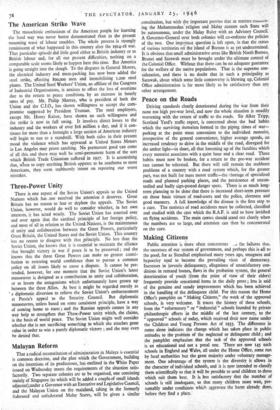The American Strike Wave
'The masochistic enthusiasm of the American people for learning the hard way .was never better demonstrated than in the present mounting wave of labour troubles. The whole process is strongly reminiscent of what happened in this country after the 1914-18 war. That particular episode did little good either to British industry or to British labour and, for all our present difficulties, nothing on a comparable scale seems likely to happen here this time. But America is going straight into the slough. To the disputes in General Motors, the electrical industry and meat-packing has now been added the steel strike, affecting 800,000 men and immobilising 1,200 steel plants. The United Steel Workers' Union, an affiliate of the Congress of Industrial Organisations, is anxious to offset the loss of overtime due to the return to peace conditions by an increase in hourly rates of pay. Mr. Philip Murray, who is president of both the Union and the C.I.O., has shown willingness to accept the com- promise suggested by President Truman. The steel employers, except Mr. Henry Kaiser, have shown no such willingness and the strike is now in full swing. It involves direct losses to the industry and the workers of over $16 million a day, and if it con- tinues for more than a fortnight a large section of American industry will begin to run to a standstill. With both sides in their present mood the violence which has appeared at United States Motors in Los Angeles may prove catching. No permanent good can come of all this and there may well be semi-permanent harm of the sort which British Trade Unionism suffered in 1927. It is astonishing that, when to copy anything British appears to be anathema to most Americans, they seem stubbornly intent on repeating our worst mistakes.






























 Previous page
Previous page